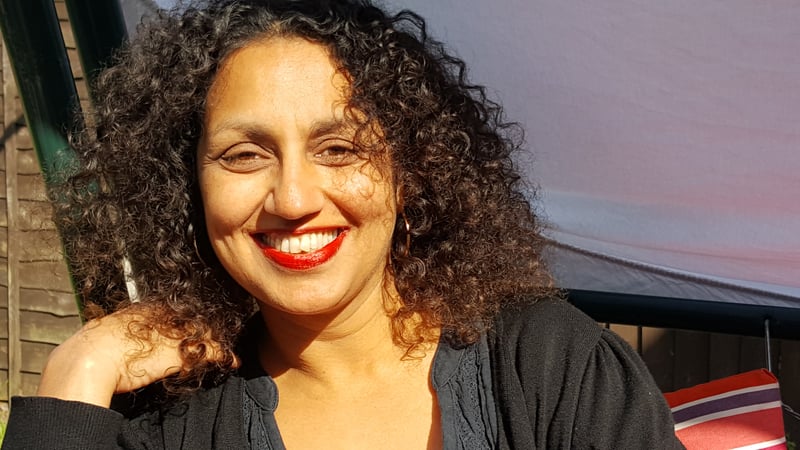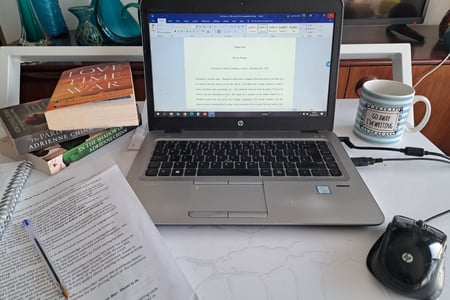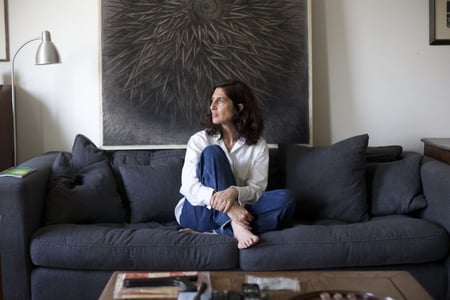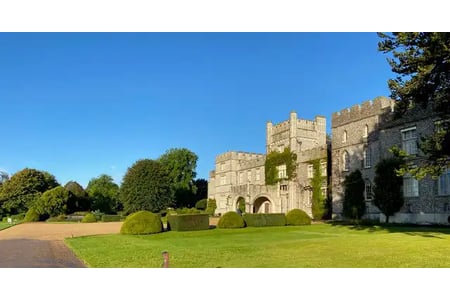"In early November, I was invited to be the Writer-in-Residence at West Dean College for the week: to retreat from those daily duties which present obstacles to creative practice, and to engage with the small but thriving writing community at the college. I was delighted to be asked; the prospect of spending a few days being a bonafide author, editing my second novel without distraction, in a beautiful setting was welcomed with open arms.
In my keeness to escape from the day job and domesticity I didn’t give much thought to West Dean’s history or its location. So, when I arrived, in the pouring rain on a bitter Monday morning, I unexpectedly found myself slap bang in the middle of the English countryside, with it’s pretty villages and seemingly homogenous, affluent inhabitants; it was a world away from my own inner city, immigrant Brummie background, and, I must admit I felt a little out of my comfort zone. Don’t get me wrong, I was very pleased to be there and I coudn’t have been made more welcome by staff and students alike, plus my rooms were lovely and I reckon I was pretty lucky to be invited in the midst of autumn when the grounds were truly spectacular. However, there were a couple of things which reinforced that initial slight sense of unease: first was the unsettling collection of artefacts in the main West Dean House: glass-cased lions and a giraffe’s head stuffed and displayed as a grotesque trophy above the wide stairwell and nearby, an exquisite Nigerian Ekoi sculpture, high on an ornate mantelpiece, close to the main entrance, displaced and incongrous. Later, there was a mildly disconcerting walk back to my accommodation after dusk - I’m far more at ease walking through brightly lit, highly populated urban landscapes at night than I am through the relatively empty, dark and very quiet countryside.
I hope I don’t sound ugrateful; I am anything but. I loved my time at West Dean: it was productive and a much needed tonic after a few months of unrelenting hard graft. But it was a different environment for me, and not one I am naturally at home in. However, as a writer I know it is always good to step beyond our comfort zones because it’s only by taking ourselves to other places, literal or methaphorical, that we discover who we are and enhance our imaginations, allowing them to fly. This sense of self-discovery was amplified by a few things in particular during my stay. Firstly, when I arrived I had absolutely no knowledge of Edward James (the last private owner of the Estate) but as I learned about him, it became clear that he too may have felt he didn’t belong there sometimes and it was probably this very disconnect with his own landed-gentry status and the restrictions it placed upon him which led him to seek a more liberated and adventurous social circle amongst the artists, writers and thinkers of his day. When he bequeathed West Dean to the pursuit of arts and consevation, I like to think it was in a bid to break the reactionary mould he found himself trapped in, influenced in this decision by his diversity of associations. This made me curious about him - a man at odds with his environment who, rather than allowing it to crush him, found a way to live more freely by surrounding himself with new ways of thinking and being. Secondly, over the few days I spent at the West Dean, I spoke to some of the people involved in both delivering and undertaking courses at the college. All those I talked to were both interesting and interested, and it very quickly became obvious that each was, in their own way, furthering the legacy of Edward James with varying levels of radicalism by exploring new approaches to and of creativity for themselves and for one another. I liked watching and listening to the students and teachers discussing and experiencing the transformative effects of creative practice; it made the atmosphere at the college almost visceral, exuding down plush original hallways and through state-of-the-art studios dotted about the estate, both existing harmoniously with the other. Finally, and probably most surprisingly for me, I realised I’m not quite as nervous of dark walks down quiet country lanes as I thought I was; in fact, I quite enjoyed the mindful process of walking through crisp night air at the end of the day with only the rustle of autumn leaves and a heavy sky for company.
I was invited to take up this residency by fellow author, Mark Radcliffe who runs the Creative Writing programme at West Dean College of Arts and Conservation. Mark knows me and he knows my work and, in retrospect, I’m guessing he put my name (alongside other invited residents) forward so his students have opportunities to meet and engage with writers from a variety of different backgrounds since, as we all know, if we only ever engage with those who are similar to ourselves, things can get a little tedious at best and, at worst, stagnant. I am sure Mark would agree that as writers it’s important we expose ourselves to different points of view and ways of existing, just as Edward James did. Literature is all about difference and nuance and, whether we set our stories in the past, present or speculative future, we are reflecting on the world from a certain standpoint so the more nuance and difference we bring to that standpoint the better. Ultimately, good literature is that which transports us and at the same time allows us to find ourselves in alternative realities by offering connection through the many universal threads which bind us. If we, as artists and just as people in fact, limit our influences and exposures, staying stuck in our own little bubbles, we limit both the possibilities of our work and restrict our ability to connect with one another. These are the things I was reminded of as I settled into my residency.
So, having arrived at West Dean feeling a bit out of place, I left feeling fairly certain that Edward James and I would have enjoyed a jug of red wine together, talking late into the night about art, music, literature, how we could shake up our respective worlds and the many other things which connect us. Perhaps we’d find ourselves joined by a few of the artists and writers, past and present, who pass through West Dean, and together we’d raise a glass to Mr James and thank him for sharing the estate with us while we all enjoy the sunrise over the gentle hills and majestic tree-tops beyond the windows of the grand West Dean drawing-room."



